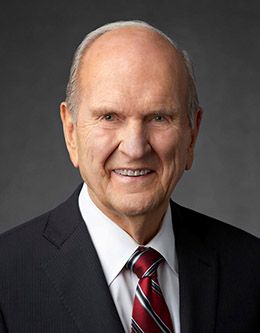This university is committed to searching for truth and to teaching the truth. All truth is part of the gospel of Jesus Christ. Whether truth comes from a scientific laboratory or by revelation from the Lord, it is compatible. All truth is part of the everlasting gospel. Brigham Young so taught: “If you can find a truth in heaven, earth or hell, it belongs to our doctrine. We believe it; it is ours; we claim it.”¹ There is no conflict between science and religion. Conflict only arises from an incomplete knowledge of either science or religion—or both.
Research and education become religious responsibilities for members of The Church of Jesus Christ of Latter-day Saints, for we know that “the glory of God is intelligence.”² And our perspective is enlarged by knowing that “whatever principle of intelligence we attain unto in this life, it will rise with us in the resurrection.”³
Meanwhile, there will always be more to learn, especially when studying topics that relate to the Creation, physiology, and the laws of life. Why? Because life comes from God. There will always be a gap between what He knows and what we now know.
He has revealed the following promise, which may bring comfort to those who cannot find answers to all of their questions at this point in time. He said:
Yea, verily I say unto you, in that day when the Lord shall come, he shall reveal all things—
Things which have passed, and hidden things which no man knew, things of the earth, by which it was made, and the purpose and the end thereof—
Things most precious, things that are above, and things that are beneath, things that are in the earth, and upon the earth, and in heaven.⁴
In the BYU Life Sciences Building, the focus will be centered on learning from and about God’s living creations. Now I will confess a personal prejudice: I think that a person can learn more by studying God’s creations than by studying the works of people, even by the most erudite and educated scholars. Job felt the same way when he wrote:
But ask now the beasts, and they shall teach thee; and the fowls of the air, and they shall tell thee:
Or speak to the earth, and it shall teach thee: and the fishes of the sea shall declare unto thee.⁵
In my early days of research into the workings of the human heart, very little was known. There was no field of heart surgery. In fact, we were taught in medical school that one must never touch the beating heart. To do so would cause the heart to stop beating. So little by little we began to tread into uncharted waters. For me, those early exploratory experiments were buttressed by this sure word of the Lord from the Doctrine and Covenants:
All kingdoms have a law given;
And there are many kingdoms; for there is no space in the which there is no kingdom; and there is no kingdom in which there is no space, either a greater or a lesser kingdom.
And unto every kingdom is given a law; and unto every law there are certain bounds also and conditions.⁶
This knowledge, coupled with one other revelation, provided the undergirding foundation I needed for my work. The other revelation is well known to you:
There is a law, irrevocably decreed in heaven before the foundations of this world, upon which all blessings are predicated—
And when we obtain any blessing from God, it is by obedience to that law upon which it is predicated.⁷
By learning for the kingdom of the heart what laws must be obeyed for the heart to beat, eventually we were able to turn the heartbeat off and turn it on again. This enabled surgery of the heart to be predictable and dependable. Even educated and experienced doctors would wonder, Can you really do that?
The answer is simply this: When the laws of God are obeyed, wanted blessings will always result, not just maybe or sometimes. Divine law is dependable! Divine law is incontrovertible!
The great privilege of studying God’s creations builds in its students a reverence for life and a testimony that we are literally created by Deity. That reverence for our Creator represents true religion. The meaning of the word religion is literally “to ligate” or “to tie us once again” back to God.
For students, there is nowhere better to confront the questions shared between science and religion than in the College of Life Sciences at Brigham Young University.
© by Intellectual Reserve, Inc. All rights reserved.
Notes
1. Brigham Young, “Remarks,” Deseret News, 4 May 1870, 152; Journal of Discourses, 26 vols. (London: Latter-day Saints’ Book Depot, 1854–86), 13:335 (24 April 1870).
2. Doctrine and Covenants 93:36.
3. Doctrine and Covenants 130:18.
4. Doctrine and Covenants 101:32–34; emphasis added.
5. Job 12:7–8.
6. Doctrine and Covenants 88:36–38.
7. Doctrine and Covenants 130:20–21.

Russell M. Nelson was a member of the Quorum of the Twelve Apostles of The Church of Jesus Christ of Latter-day Saints when he delivered these remarks at the dedication of the BYU Life Sciences Building on April 9, 2015.


